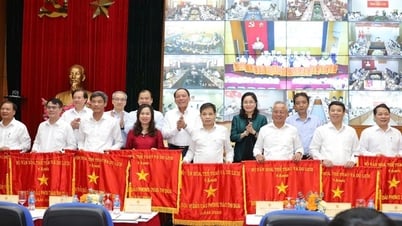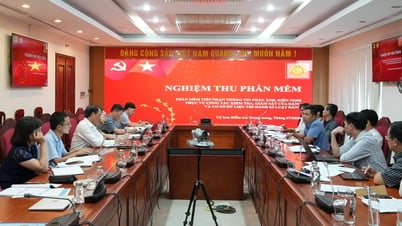Resolution 198/2025/QH15, passed by the 15th National Assembly on May 17, 2025, has concretized the Party's ideas from "management" to "creating, supporting and serving" the private sector.
Along with that is the elimination of prejudice, creating a fair competitive environment among economic sectors. The policy is clear, but to ensure that private enterprises are not limited in their development space, there is still much work to be done.

1. The renovation process initiated by the Party in 1986 began by recognizing a multi-sector market economy, removing all checkpoints that blocked markets and allowed people to freely conduct business.
After nearly 40 years of innovation, our country now has a large number of private enterprises, including many strong economic groups, mastering techniques and technology to produce high-quality products, not only meeting domestic demand but also exporting to the world .
The renovation process has taught us many lessons, and we must continuously adjust policies based on reality. After many revisions and reviews of the business environment, there are still many barriers that prevent the private economic sector from meeting the requirements despite its many achievements, especially in the era of development. The administrative apparatus is still heavily managerial and controlling, and has not really played a role in creating and serving development.
2. Resolution 198/2025/QH15 has specified the major policies of Resolution 68-NQ/TW, such as "Limiting inspection and examination of each unit to no more than once a year, unless there are clear signs of violations"; "Prohibiting duplication between inspection and examination, encouraging the use of digital transformation, prioritizing remote inspection"; "Ensuring fair competition, eliminating all barriers of discrimination between economic types"... It can be affirmed that when these regulations come into effect, they will reduce many of the inconveniences that private enterprises have always had to deal with in the past.
The green transformation sector seems to be the sole responsibility of state-owned enterprises, but Resolution 198/2025/QH15 also expands opportunities for private enterprises to participate. Specifically, the State has built a 2%/year interest rate support package for private enterprises, households and individuals doing business to borrow capital to implement green and circular economic projects. Along with that are incentives on taxes, fees and charges, such as 100% exemption of corporate income tax in the first 2 years and 50% reduction in the next 4 years for innovative start-up enterprises; 100% exemption of personal income tax in 2 years and 50% reduction in 4 years for income from salaries and wages of experts and scientists received from innovative start-up enterprises, innovation centers... These incentives have great motivational value for private enterprises as well as individuals who dare to venture into new fields.
It is worth noting that, according to Resolution 198/2025/QH15, private enterprises are allowed to participate in national key projects, applying the method of designated bidding or limited bidding in strategic sectors. This opens up great opportunities for private enterprises, especially in the context of our country promoting the implementation of many strategic programs, key and important national projects such as high-speed railways, urban railways, platform industries, spearhead industries, energy infrastructure, digital infrastructure, green transportation, etc.
Realizing the spirit of Resolution 68-NQ/TW, Resolution 198/2025/QH15 has created conditions for private enterprises to participate deeply in the national economy, easily access national projects, state investment, and shorten the gap with the FDI sector and state-owned enterprises. It can be said that with this openness, private enterprises will no longer be limited in development space.
3. Resolution 198/2025/QH15 is considered a "boost" for the private economy, however, the implementation process will face many challenges. Anticipating this, the Government has requested a review and removal of unnecessary administrative procedures and business conditions, setting a completion date of December 31, 2025. The goal is to reduce at least 30% of time, costs and conditions, but the large scale means that despite the urgent progress, there is still a risk of delay. Along with that, each locality has different implementation capacity, which can easily lead to a situation of "hot above, cold below", leading to the spirit of the resolution not being optimally realized.
In addition, the capacity of the apparatus at all levels and the slow digital transformation process are still concerns. Inspection and examination reform requires a strong shift to remote inspection, but many places have not prepared enough infrastructure, data is fragmented, and personnel are not yet proficient in technology, so overlapping inspections can still occur.
Another problem is that, due to “historical legacy”, there was a time when the state-owned economy was dominant, so state-owned enterprises had an advantage in accessing capital and land, making it difficult for private enterprises to compete fairly. In reality, private enterprises still face many difficulties in accessing essential resources. Although barriers to credit capital, land, and high-quality human resources are only psychological factors, it will take time for private enterprises to be treated equally with other sectors.
Handling violations in economic relations, avoiding criminalization is also a big problem. In principle, prioritizing administrative/civil handling, not retroactive, presuming innocence... is very progressive but requires the court system and investigative agencies to change a lot in the way they work, which is not easy to implement synchronously nationwide.
No matter how superior the policy is, there is still a gap between the document and the reality. Therefore, to put the resolution into practice, it requires the synchronous and drastic participation of the entire political system and each business and citizen.
Source: https://hanoimoi.vn/cu-hich-cho-kinh-te-tu-nhan-709955.html






































































































Comment (0)